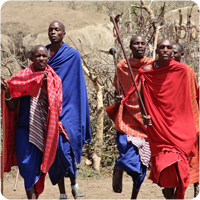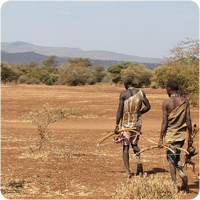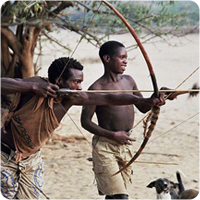Het arrangement Tanzania hunter-gatherers h45 is gemaakt met Wikiwijs van Kennisnet. Wikiwijs is hét onderwijsplatform waar je leermiddelen zoekt, maakt en deelt.
- Auteur
- Laatst gewijzigd
- 11-05-2025 22:23:33
- Licentie
-
Dit lesmateriaal is gepubliceerd onder de Creative Commons Naamsvermelding-GelijkDelen 4.0 Internationale licentie. Dit houdt in dat je onder de voorwaarde van naamsvermelding en publicatie onder dezelfde licentie vrij bent om:
- het werk te delen - te kopiëren, te verspreiden en door te geven via elk medium of bestandsformaat
- het werk te bewerken - te remixen, te veranderen en afgeleide werken te maken
- voor alle doeleinden, inclusief commerciële doeleinden.
Meer informatie over de CC Naamsvermelding-GelijkDelen 4.0 Internationale licentie.
Aanvullende informatie over dit lesmateriaal
Van dit lesmateriaal is de volgende aanvullende informatie beschikbaar:
- Toelichting
- Deze les valt onder de arrangeerbare leerlijn van de Stercollectie voor Engels voor havo, leerjaar 4 en 5. Dit is thema 'Societies'. Het onderwerp van deze les is: Tanzania hunter-gatherers. Deze les gaat over verschillende soorten maatschappijen. Er wordt speciale aandacht gegeven aan de de jagers en verzamelaars in Tanzania.
- Leerniveau
- HAVO 4; HAVO 5;
- Leerinhoud en doelen
- Engels;
- Eindgebruiker
- leerling/student
- Moeilijkheidsgraad
- gemiddeld
- Studiebelasting
- 4 uur 0 minuten
- Trefwoorden
- arrangeerbaar, engels, h45, maatschappij, stercollectie, tanzania hunter-gatherers

 In this next lesson is Tanzania: hunter gatherers.
In this next lesson is Tanzania: hunter gatherers.


 Let’s think about what society actually means.
Let’s think about what society actually means.

 Society has also to do with thinking about your own beliefs and values about possession and ownership.
Society has also to do with thinking about your own beliefs and values about possession and ownership.

 You are going to read a text about people whose society is different to yours.
You are going to read a text about people whose society is different to yours. Mike Carter August 22, 2015
Mike Carter August 22, 2015 Read and answer these questions with your partner.
Read and answer these questions with your partner. In step 5 you have spoken about how can you protect the Hadza, and yet still give the tourists (wealthy Americans) an insight into their lives.
In step 5 you have spoken about how can you protect the Hadza, and yet still give the tourists (wealthy Americans) an insight into their lives. Fill in the schedule and answer the questions below.
Fill in the schedule and answer the questions below.